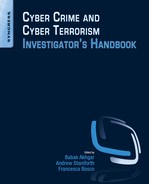Foreword
It is a real privilege to be invited to write the Foreword for the Cyber Crime and Cyber Terrorism Investigators’ Handbook. This new volume provides an authoritative and accessible guide of substantial practical and operational value which, for the very first time, ensures all security practitioners have a trusted reference and resource to navigate them through the challenges and complexities of investigating cyber crime and cyber terrorism.
The growing role of cyberspace in society has opened up new threats as well as new opportunities. A growing number of individuals and groups are looking to use cyberspace to steal, compromise or destroy critical data, and the national security machinery of governments have no choice but to find ways to confront and overcome these threats if they are to flourish in an increasingly competitive and globalized world.
As citizens put more of their lives online, the safety of cyber space matters more and more. People want to be confident that the networks which support their nation’s security, their prosperity, and their own private lives as individuals, are both safe and resilient. The scale of citizen and state dependence on cyber space now means that our economic well-being, our key infrastructure, our places of work and our homes can all be directly affected.
There are, of course, crimes that only exist in the digital world, in particular those that target the integrity of computer networks and online services. But cyberspace is also being used as a platform for committing crimes such as fraud, and on an industrial scale. Identity theft and fraud online now dwarf their offline equivalents. The internet has also provided new opportunities for those who seek the sexual exploitation of children and the vulnerable.
Cyberspace allows criminals to target countries from other jurisdictions across the world, making it harder to enforce the law. Cyber criminals can operate from anywhere in the world, targeting large numbers of people or businesses across international boundaries, and there are challenges posed by the scale and volume of their crimes, the technical complexity of identifying the perpetrators as well as the need to work internationally to bring them to justice. The internet has unfortunately enabled aspiring criminals to commit offences, based on a belief that law enforcement struggles to operate in the online world.
The internet has also changed—and continues to change—the very nature of terrorism. The internet is well suited to the nature of terrorism and the psyche of the terrorist. In particular, the ability to remain anonymous makes the internet attractive to the terrorist plotter. Terrorists use the internet to propagate their ideologies, motives and grievances as well as mounting cyber attacks on critical infrastructures. Modern terrorism has rapidly evolved, becoming increasingly nonphysical, with vulnerable “home grown” citizens being recruited, radicalized, trained and tasked online in the virtual and ungoverned domain of cyber space.
To support the emergence of cyber-based investigations, the Cyber Crime and Cyber Terrorism Investigators’ Handbook is enriched with case studies, explanations of strategic responses and contextual information providing the theoretical underpinning required to effectively tackle cyber crimes. This unique volume serves to explore and explain the responsibilities of law enforcement agencies to address online criminal and terrorist activity. Authored and edited by a multi-disciplinary team of experts from academia, law enforcement and private industry, this new volume shall be a welcome introduction to the resource library of cyber investigators.
Lord Carlile of Berriew CBE QC
